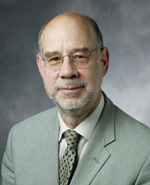February 14, 2011 - By Kris Newby

Harry Greenberg
Five medical technology teams from Stanford Biodesign have received a total of $125,000 through the Spectrum pilot grant program.
The biodesign program and Spectrum, the Stanford Center for Clinical and Translational Education and Research, are working together to improve and advance the training of young innovators, while at the same time accelerating the development of novel medical technologies and diagnostics. Biodesign projects are funded by a Clinical and Translational Science Award from the National Institutes of Health, and Stanford institutional and philanthropic funds.
“The biodesign approach to identifying and tackling clinical needs has been extremely effective,” said Spectrum director, Harry Greenberg, MD. “As of 2010, biodesign inventions have resulted in almost 200 patent applications, and over 35,000 patients have been treated by devices created through the program.”
The five projects and investigator teams receiving funds include:
- An image-guided device that prevents gallstone obstruction in patients who want to avoid surgery — Matthew Callaghan, MD, postdoctoral scholar, and Thomas Krummel, MD, chair of surgery.
- A low-cost test for diagnosing diseases such as malaria, tuberculosis and African sleeping sickness in underserved global regions — Manu Prakash, PhD, assistant professor of bioengineering.
- A novel approach to cardiac rhythm support that reduces complications associated with current technologies — Aravind Swaminathan, MD, and Ellis Garai, both graduate students and former biodesign fellows.
- An advanced system for treating atrial fibrillation, a heart rhythm problem affecting more than 2 million Americans — Paul Wang, MD, professor of cardiovascular medicine; Fritz Prinz, PhD, chair of the mechanical engineering; Robert Robbins, MD, chair of cardiothoracic surgery; and Amin Al-Ahmad, MD, assistant professor of cardiovascular medicine.
- A minimally invasive treatment for chronic venous insufficiency, in which damaged veins are not able to pump enough oxygen-poor blood back to the heart — Fletcher Wilson, biodesign fellow and R. James Yu, MD, urology fellow
About Stanford Medicine
Stanford Medicine is an integrated academic health system comprising the Stanford School of Medicine and adult and pediatric health care delivery systems. Together, they harness the full potential of biomedicine through collaborative research, education and clinical care for patients. For more information, please visit med.stanford.edu.